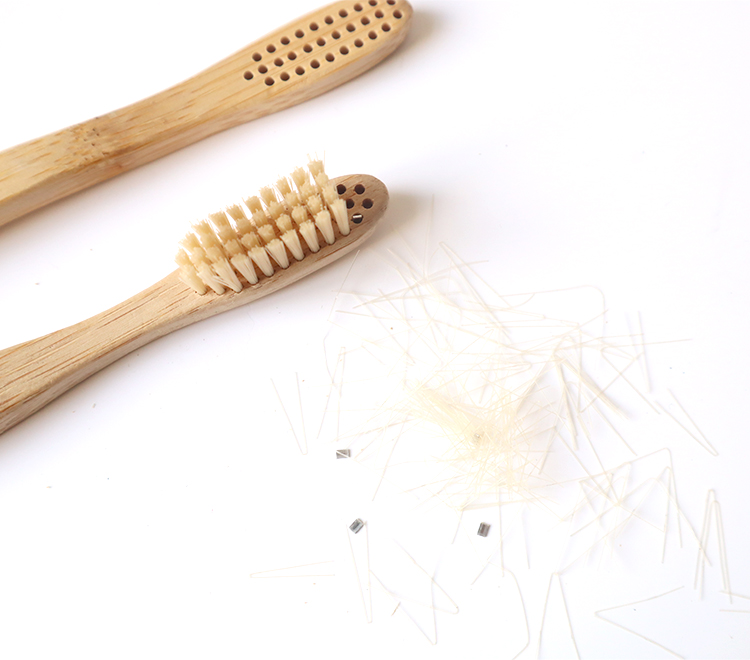News
Why Do Bamboo Toothbrushes Have Nylon Bristles?

Is Nylon Bad for the Environment?
Nylon is a strong, flexible material, ideal for products that can withstand a lot of friction, and the first choice for many household goods. Perhaps the most famous example of nylon use is for ‘nylons,’ thin, see-through tights used in place of socks or stockings. These well-known tights are the perfect example of the flexibility and strength of nylon, which is able to retain its structure even through pulling, all-day wear, and the friction of legs moving and touching.
Nylon is made from petrochemicals, synthetic products derived from petroleum. Nylon is, from the very start, non-biodegradable, as most petroleum based products are. Nylon production is responsible for relatively high levels of greenhouse gas emissions, infamous for emitting nitrous oxide, a greenhouse gas 310x more potent than carbon dioxide. For these reasons, environmentalists are quick to condemn the use of nylon, calling for alternatives to this strong, flexible, and extremely useful product.
Nylon Toothbrush Bristles
As one of the earliest discovered plastics that could be made into fibers, nylon quickly became a staple for toothbrush manufacturers everywhere. Nylon holds up for weeks against even the most aggressive toothbrushers, and can easily be rinsed and dried without risking redistribution of bacteria from use to use. Nylon is, as of now, the most durable options for toothbrush bristles, and can be manufactured to be softer or firmer depending upon the preferences of the brusher.
Other plastics cannot be formed into the same durable fibers nylon naturally forms, and would not be able to withstand continued use. Before nylon was discovered, toothbrush bristles were made from natural animal hair, but this practice was quickly abandoned in favor of the more durable nylon.
Nylon Alternatives
Though nylon has become the accepted material used for toothbrush bristles, there are several alternatives. Here are the pros and cons of the various nylon alternatives currently available in the world of toothbrush bristles:
Sisal
Sisal is a natural fiber derived from the agave plant, and is most commonly used in the making of fabric, rope, hats, rugs, and other textiles. Recently, Sisal has gained popularity as the fiber most commonly used as bristles on dry brushes. Dry brushing is a practice said to help reduce inflammation and improve lymph drainage throughout the body. Typically too rough for comfortable tooth brushing, sisal should primarily be reserved for textiles and tools(dish brush/scrubber brush/pot brush…)
Pros:
- Sisal is natural and biodegradable
Cons:
- Sisal bristles are often too hard and unyielding, scratching the enamel surface of the teeth
- Sisal bristles can cause gum and skin irritation
- Sisal bristles bend and break with continued use, and rarely last more than a few uses before needing replacing
Jute
Jute is yet another natural fiber derived from a plant. In this case, Jute is the fiber and the plant, and is the second most affordable natural fiber, second only to cotton. Soft, silky, and easy to produce, Jute fibers are ideal for the production of textiles like curtains, chair coverings, and linoleum backing.
Pros:
- Jute is natural and biodegradable
Cons:
- Jute fibers are too soft to hold up to the vigorous job of brushing, and bend far more quickly than nylon or even sisal fibers. This can leave the toothbrush fibers frayed and useless
- Lacking the structure of nylon, jute does not clean or remove plaque as effectively when used for toothbrush bristles
Boar Hair
Boar have thick, bristly hair that was commonly used for toothbrushes, hair brushes, and paint brushes prior to the invention of synthetic fibers. Boar bristles are durable, and comparable in feel to nylon bristles, but they come with some serious down-sides.
Pros:
- Natural and biodegradable
- Stiff and effective at removing plaque and bacteria buildup
Cons:
- Boar bristles are a direct byproduct of the meat industry. All boar bristles are harvested from dead boar, killed either to be eaten, or purely for the use of their hair. This may not pose a problem for some, but the major negative side effects of the meat industry and the ethics of using boar bristles are enough to make this an unpopular option
- Boar bristles can be too stiff, scratching or causing irritation to the teeth or gums
- Boar bristles do not last very long, and after a few uses become useless, meaning you have to buy more toothbrushes over time
- Some users report a foul odor accompanying their boar hair bristles
The Best Eco-Friendly Toothbrush
Now that you know that toothbrush bristles made of nylon alternatives are rarely a good option, you may still be wondering how you should feel about using nylon. We understand. You want to be choosing the most eco-friendly products, not just for yourself, but for the health of the planet. This problem is complicated, and one that involves a little bit of give and take.
CATEGORIES
LATEST NEWS
CONTACT US
Name: Petter
Mobile:
Tel:86 0574-55227829
Email:info@healthbu.com
Add:No.260 XiaoGao West Road,Yinzhou 315194,Ningbo City,China
